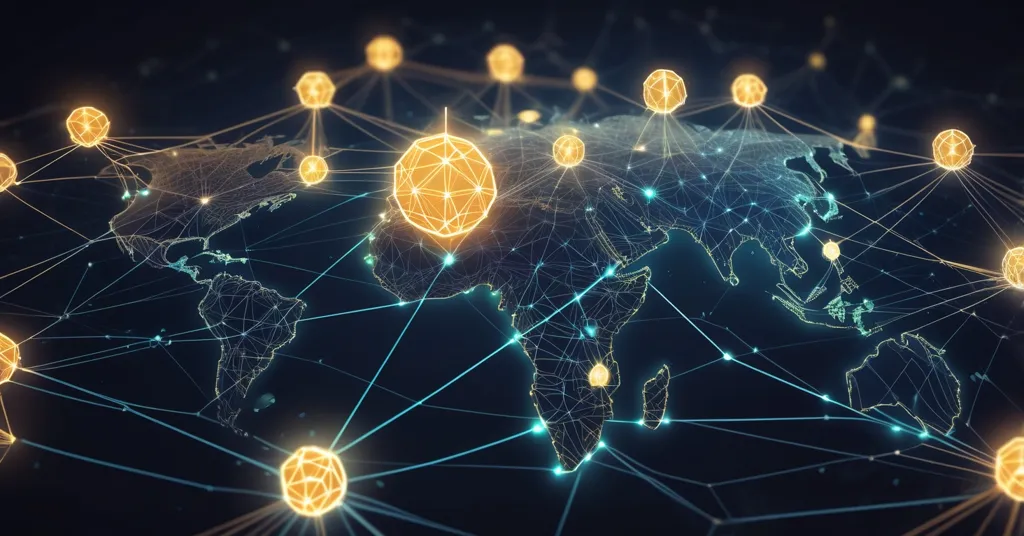China’s AI Deals with Brazil & Australia: Blockchain’s Crucial Role in Tech Power Play

China’s AI Expansion with Brazil and Australia: Tech Power Plays and Blockchain’s Hidden Role
China is aggressively broadening its technological footprint, striking AI partnerships with Brazil and Australia to sidestep U.S. trade barriers and amplify its global influence. These alliances promise groundbreaking advancements in agriculture and green energy, but they also stir up critical debates about data control, geopolitical agendas, and the untapped potential of blockchain to secure such high-stakes collaborations.
- China-Brazil AI Initiative: A collaborative lab to transform subsistence farming in semi-arid regions using AI for efficiency and environmental monitoring.
- China-Australia Trade Talks: Upcoming discussions may weave in AI and green tech, though security and data concerns cast a shadow.
- Blockchain’s Promise: Decentralized technology could safeguard data integrity and privacy in these international AI ventures.
Why This Matters for Crypto Enthusiasts
Let’s get straight to the point: why should Bitcoin and blockchain advocates give a damn about China’s AI maneuvers? It’s not just about fancy tech or farming—it’s about control. Every piece of data harvested, every algorithm fine-tuned, becomes a tool in the global power struggle. For those of us who live and breathe decentralization, this is a neon sign flashing the importance of Bitcoin and its ecosystem. Centralized tech, whether it’s AI or state-backed digital currencies like China’s digital yuan, often bends to government whims, stripping away privacy and freedom. Blockchain throws a wrench in that machine, offering a way to secure data and transactions beyond the reach of nation-states. These partnerships, such as those outlined in recent reports on China’s expanding AI alliances with Brazil and Australia, could dictate how data is managed worldwide, making the push for decentralized alternatives not just timely, but urgent. If we’re serious about a future where innovation doesn’t equal surveillance, embedding blockchain into AI systems isn’t optional—it’s critical. Even as Bitcoin maximalists, we can’t ignore this battlefield. The fight for autonomy is unfolding right here, and we’d better pay attention.
China-Brazil AI Lab: Farming the Future
At the recent BRICS summit in Rio de Janeiro, China and Brazil, key players in the BRICS alliance of emerging economies, signed a landmark deal to launch an AI laboratory focused on subsistence farming in semi-arid regions. These areas are no small challenge—covering 11% of Brazil’s territory, particularly in the Sertão region, and affecting 22 million people with sparse vegetation and brutal climates. China faces similar struggles in its own arid zones, making this a shared pain point. The partnership unites Brazil’s National Semi-Arid Institute (INSA) and China Agricultural University to leverage AI for boosting crop yields, optimizing scarce resources, and tracking environmental factors like soil degradation. Picture AI as a hyper-intelligent farmhand, analyzing vast datasets to predict the perfect moment to plant or irrigate, scaled up to entire regions. For more on this collaboration, see the detailed coverage of the China-Brazil AI farming initiative with INSA.
INSA Director José Etham Barbosa framed this as more than just a tech experiment, emphasizing its potential impact on local communities:
“We are bringing together various institutions to advance technology transfer, promote well-being, and embed these technologies into machinery for environmental and soil monitoring so that we can transform the semi-arid region through this partnership.”
This isn’t some isolated project. AI in agriculture is on a rocket trajectory, with market projections estimating a surge to $10 billion by 2032, according to Grand View Research. Governments worldwide are diving in—Thailand has AI-driven farming apps, while Japan deploys robotic harvesters. For China and Brazil, this collaboration doubles as a geopolitical maneuver. It strengthens BRICS economic bonds and gives China a backdoor to bypass U.S. semiconductor restrictions—those harsh policies blacklisting Chinese firms from accessing advanced chips vital for AI. If you can’t buy the tech, ally with those who can. Insights into how these U.S. semiconductor restrictions impact China’s AI strategy highlight the broader context of these partnerships. But let’s not get swept away by the hype. Brazil is playing a delicate game, cozying up to China for investment while avoiding formal Belt and Road commitments to keep the U.S. from losing its temper. It’s a diplomatic tightrope, and the stakes couldn’t be higher when tech is the new currency of power. What’s the real cost to Brazil’s independence if China’s influence digs deeper? That’s a question worth chewing on.
Beyond agriculture, the China-Brazil relationship spans semiconductors, renewable energy, maritime industries, space technology with joint satellite projects, and climate efforts like the Tropical Forests Forever Fund for COP30. This isn’t a one-trick pony—it’s a full-on strategic alliance. Brazil’s juggling act, balancing Chinese tech benefits against Western alliances, mirrors the broader global tension where innovation often comes with strings attached. For us in the crypto space, it’s a reminder that centralized tech deals can reshape autonomy in ways Bitcoin fundamentally opposes.
China-Australia: A Cautious Tech Dance
Meanwhile, China is setting its sights on Australia, a tech-savvy nation with a complicated history of bilateral relations. Australian Prime Minister Anthony Albanese’s visit to China from July 12-18 aims to build on a decade-old free trade agreement, with AI and green energy potentially on the agenda. Chinese Ambassador Xiao Qian has been outspoken about integrating AI into these trade talks, eyeing Australia’s dynamic tech ecosystem. And Australia isn’t just sitting idle—its AI landscape includes military applications, private sector projects like ClimateForce and NTT Group protecting the Daintree Rainforest, and massive investments from giants like Microsoft ($3.2 billion AUD in 2023 for cloud and AI infrastructure) and Amazon. It’s a goldmine of innovation that China clearly wants a piece of. Learn more about the complexities of this relationship in discussions around China-Australia AI and trade talks under Albanese’s visit.
But here’s where it gets sticky: national security and data sovereignty—basically, the principle that data is governed by the laws of the country where it’s collected—loom as massive roadblocks. Handing over access to AI systems could be a treasure trove for espionage or economic leverage, a risk Australia knows all too well. Past tensions, like the 2018 ban on Huawei over spying fears, still linger. Toby Walsh, a professor at the University of New South Wales, suggests a safer path forward:
“It’s about exchanging people, it’s training, it’s us going to work with them and them coming to work with us.”
Translation: stick to talent swaps and research collaboration rather than sharing sensitive data. Albanese’s guarded stance—“we will determine our policy”—screams hesitation. And why not? Data is the new oil, and trust with China remains fragile, even as relations have thawed since the low point under former PM Scott Morrison. Frankly, we’re not kidding ourselves—Australia’s history with China reads like a soap opera of epic proportions. For a deeper look into these dynamics, check out perspectives on Australia-China tech trade security issues. For those of us obsessed with decentralization, this standoff is a glaring neon sign. If centralized data-sharing is the sticking point, blockchain could be the game-changer. Let’s dive into that next.
Blockchain’s Role: Securing the AI Revolution
Now, let’s zero in on a perspective that resonates deeply with our community: how blockchain can step into this AI frenzy. With Australia sweating over data sovereignty and Brazil navigating geopolitical minefields, the demand for secure, transparent data systems is screaming loud. Enter enterprise blockchain—a decentralized ledger that guarantees data integrity, ownership, and immutability. Imagine AI models for farming or environmental monitoring running on a blockchain: every data point, from soil moisture readings to crop yields, logged in a way no single government or corporation can tamper with. Suddenly, fears of data manipulation or theft take a backseat. This isn’t some far-off dream—blockchain is already making waves in supply chains. IBM’s Food Trust, for example, tracks produce from farm to shelf on a secure ledger. Extend that to AI-collected data, and you’ve built trust in a world desperately short on it. Academic resources on blockchain applications for AI data security provide further exploration of these concepts.
As Bitcoin maximalists, this ties directly to our core mission of dismantling centralized overreach. State-driven AI or digital currencies like China’s digital yuan often prioritize control over individual freedom. Blockchain, born from Bitcoin’s rebellious spirit, offers a counterweight—safeguarding privacy and autonomy. But let’s keep it real: Bitcoin itself might not handle the high-speed, complex data flows these AI partnerships demand. This is where altcoins and other blockchains carve out their niche. Ethereum’s smart contracts could automate data-sharing agreements between nations, ensuring transparency without middlemen. Solana’s low-cost, high-speed transactions might power AI data marketplaces. These aren’t betrayals of Bitcoin’s primacy; they’re complementary tools in our messy financial and tech revolution. Curious about this synergy? Check out community discussions on how blockchain secures AI collaborations.
Still, let’s not drink our own Kool-Aid. Blockchain isn’t a magic fix—scalability is a persistent pain, and energy consumption debates, especially for proof-of-work systems like Bitcoin, could clash with green AI initiatives. Critics would argue it’s too slow or costly for real-time AI demands. Valid points, but layer-2 solutions and proof-of-stake networks are chipping away at these hurdles. The bigger issue is adoption: will a nation like China, obsessed with control, even entertain decentralized alternatives? Or are we just shouting into the void while centralized tech tightens its grip? Picture a Brazilian farmer uploading crop data to an AI system, secured by a blockchain ledger no government can twist—that’s the future we’re gunning for, but it’s a fight we might not win without serious push.
The Geopolitical Chessboard: Power or Partnership?
Stepping back, let’s tackle the elephant in the room: are China’s AI partnerships true collaborations or a polished power grab? Brazil gains tech and investment, no doubt, but at what price? Deeper ties could erode its sovereignty, especially as China’s influence seeps into semiconductors, space tech with joint satellites, and beyond. Australia faces the same dilemma—even limited cooperation risks long-term dependency on Chinese infrastructure. And let’s not forget the U.S., watching from the sidelines, ready to tighten sanctions or throw diplomatic tantrums if these alliances threaten its tech dominance. If you can’t buy the chips, build the alliances—China’s playing 4D chess while the U.S. sticks to checkers. Broader context on such international efforts can be found at resources like the Global Partnership on Artificial Intelligence wiki.
For those of us in the crypto world, this isn’t just geopolitics—it’s a clash over the soul of technology. State-driven innovation often leans toward surveillance and control, the exact opposite of Bitcoin’s decentralized ethos. If China’s pushing centralized AI or CBDCs through these deals, it’s a wake-up call. We need to embody effective accelerationism—ramping up tech not for profit, but for freedom. Bitcoin and blockchain aren’t just tools; they’re ideologies battling state power plays. Can they hold their ground? That’s the trillion-dollar gamble, and the outcome could reshape everything we stand for.
The Road Ahead: Balancing Innovation and Autonomy
Looking forward, China’s AI push with Brazil and Australia marks a seismic shift in global tech dynamics. Innovation in agriculture and energy deserves applause, but the shadows of data control and geopolitical motives aren’t going anywhere. For our community, the fusion of AI and blockchain paints a compelling vision—a future where tech progress doesn’t sacrifice privacy. But that vision isn’t a given; it demands relentless advocacy. We must champion decentralized systems to underpin AI, ensuring data isn’t weaponized by any single entity. For a glimpse into public sentiment on these partnerships, explore community threads like this Reddit discussion on China-Brazil AI farming labs.
Bitcoin remains our guiding light, a stubborn stand against centralized overreach. Yet, altcoins and other blockchains like Ethereum or Solana can fill crucial gaps, securing data flows Bitcoin wasn’t built for. This isn’t a betrayal of maximalism—it’s pragmatism. The path forward pits state tech against decentralized ideals in a brutal showdown for influence. Will nations adopt blockchain to secure AI partnerships, or will centralized systems drag us into digital feudalism? As defenders of disruption, let’s not be naive. This is as much a fight for autonomy as it is a tech race. With sharp skepticism and fierce optimism, we can steer toward a world where Bitcoin and its kin stand as unbreakable bastions of freedom, even as AI redraws the map.
Key Takeaways and Questions
- What drives the China-Brazil AI partnership?
It’s a joint lab targeting subsistence farming in semi-arid regions, using AI to enhance efficiency, boost yields, and monitor environmental factors like soil health—a strategic BRICS move blending tech and economic goals. - Why is Australia wary of AI collaboration with China?
National security and data sovereignty fears dominate, with risks of espionage or dependency on Chinese tech outweighing benefits, rooted in past tensions like the Huawei ban. - How can blockchain bolster AI initiatives globally?
Blockchain ensures data integrity and privacy via decentralized ledgers, slashing risks of manipulation or theft in AI applications like agriculture or energy monitoring. - Is China’s AI outreach a collaboration or a strategic maneuver?
While delivering real tech advancements, it may also be a bid for market access and influence, potentially compromising partners’ long-term autonomy in tech and data control. - How does China’s AI push impact the crypto space long-term?
It heightens the clash between centralized state tech and decentralized systems like Bitcoin, underscoring the urgency of blockchain as a shield for privacy and freedom against global tech rivalries. - What role do altcoins play alongside Bitcoin in this context?
While Bitcoin embodies the ultimate decentralized ideal, altcoins like Ethereum offer smart contracts and scalability for niche AI data needs, complementing the broader fight for autonomy.



